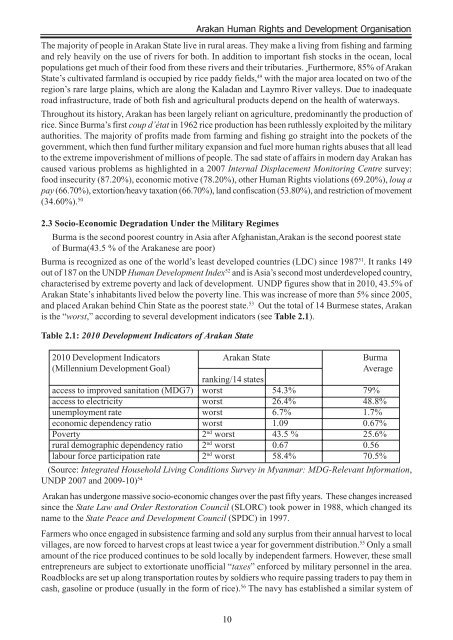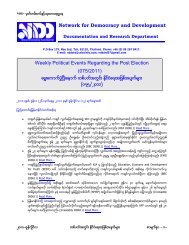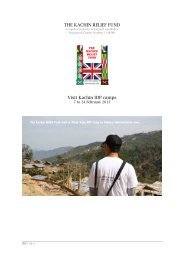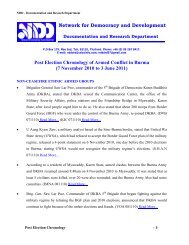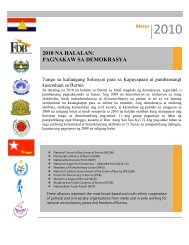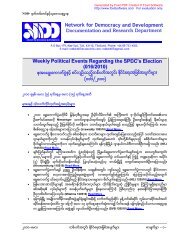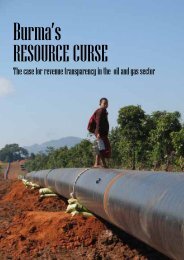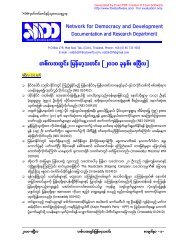Cyclone Giri - Two Years On - Burma Action Ireland
Cyclone Giri - Two Years On - Burma Action Ireland
Cyclone Giri - Two Years On - Burma Action Ireland
You also want an ePaper? Increase the reach of your titles
YUMPU automatically turns print PDFs into web optimized ePapers that Google loves.
Arakan Human Rights and Development Organisation<br />
The majority of people in Arakan State live in rural areas. They make a living from fishing and farming<br />
and rely heavily on the use of rivers for both. In addition to important fish stocks in the ocean, local<br />
populations get much of their food from these rivers and their tributaries. Furthermore, 85% of Arakan<br />
State’s cultivated farmland is occupied by rice paddy fields, 49 with the major area located on two of the<br />
region’s rare large plains, which are along the Kaladan and Laymro River valleys. Due to inadequate<br />
road infrastructure, trade of both fish and agricultural products depend on the health of waterways.<br />
Throughout its history, Arakan has been largely reliant on agriculture, predominantly the production of<br />
rice. Since <strong>Burma</strong>’s first coup d’état in 1962 rice production has been ruthlessly exploited by the military<br />
authorities. The majority of profits made from farming and fishing go straight into the pockets of the<br />
government, which then fund further military expansion and fuel more human rights abuses that all lead<br />
to the extreme impoverishment of millions of people. The sad state of affairs in modern day Arakan has<br />
caused various problems as highlighted in a 2007 Internal Displacement Monitoring Centre survey:<br />
food insecurity (87.20%), economic motive (78.20%), other Human Rights violations (69.20%), louq a<br />
pay (66.70%), extortion/heavy taxation (66.70%), land confiscation (53.80%), and restriction of movement<br />
(34.60%). 50<br />
2.3 Socio-Economic Degradation Under the Military Regimes<br />
<strong>Burma</strong> is the second poorest country in Asia after Afghanistan,Arakan is the second poorest state<br />
of <strong>Burma</strong>(43.5 % of the Arakanese are poor)<br />
<strong>Burma</strong> is recognized as one of the world’s least developed countries (LDC) since 1987 51 . It ranks 149<br />
out of 187 on the UNDP Human Development Index 52 and is Asia’s second most underdeveloped country,<br />
characterised by extreme poverty and lack of development. UNDP figures show that in 2010, 43.5% of<br />
Arakan State’s inhabitants lived below the poverty line. This was increase of more than 5% since 2005,<br />
and placed Arakan behind Chin State as the poorest state. 53 Out the total of 14 Burmese states, Arakan<br />
is the “worst,” according to several development indicators (see Table 2.1).<br />
Table 2.1: 2010 Development Indicators of Arakan State<br />
2010 Development Indicators Arakan State <strong>Burma</strong><br />
(Millennium Development Goal)<br />
Average<br />
ranking/14 states<br />
access to improved sanitation (MDG7) worst 54.3% 79%<br />
access to electricity worst 26.4% 48.8%<br />
unemployment rate worst 6.7% 1.7%<br />
economic dependency ratio worst 1.09 0.67%<br />
Poverty 2 nd worst 43.5 % 25.6%<br />
rural demographic dependency ratio 2 nd worst 0.67 0.56<br />
labour force participation rate 2 nd worst 58.4% 70.5%<br />
(Source: Integrated Household Living Conditions Survey in Myanmar: MDG-Relevant Information,<br />
UNDP 2007 and 2009-10) 54<br />
Arakan has undergone massive socio-economic changes over the past fifty years. These changes increased<br />
since the State Law and Order Restoration Council (SLORC) took power in 1988, which changed its<br />
name to the State Peace and Development Council (SPDC) in 1997.<br />
Farmers who once engaged in subsistence farming and sold any surplus from their annual harvest to local<br />
villages, are now forced to harvest crops at least twice a year for government distribution. 55 <strong>On</strong>ly a small<br />
amount of the rice produced continues to be sold locally by independent farmers. However, these small<br />
entrepreneurs are subject to extortionate unofficial “taxes” enforced by military personnel in the area.<br />
Roadblocks are set up along transportation routes by soldiers who require passing traders to pay them in<br />
cash, gasoline or produce (usually in the form of rice). 56 The navy has established a similar system of<br />
10


